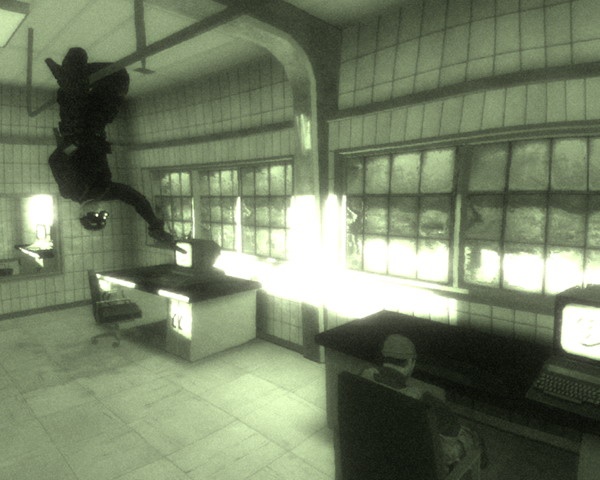Tom Clancy's Splinter Cell Double Agent Wii Hands-On
Sam Fisher will carry out his latest mission on Nintendo's next-gen console, too, and we got to try out a nearly final build.
Diehard fans of Splinter Cell are already playing the latest game, Double Agent, on their Xbox 360s. In addition to that lead next-gen version of the game, Ubisoft crafted a similar but distinctly separate version of Double Agent for current-gen platforms like the PlayStation 2. Now, the company is prepping yet another edition of Double Agent for Nintendo's quirky, forthcoming Wii that's based on the content in the PS2 version but which naturally conforms to the new system's unique controllers.
As a brief primer, the fourth Splinter Cell game sees superagent Sam Fisher turning traitor and joining up with John Brown's Army, a New York-based terrorist group, after the crushing loss of his daughter. Well, OK--Fisher's not actually a turncoat. As the name of the game implies, he's working his way deep undercover to thwart the JBA's nefarious plan of nuclear destruction from the inside. The game even contains a trust mechanic that's new to the series, whereby your choices will affect the level of trust the JBA and the National Security Agency both have for you. While the PS2 and Xbox versions of Double Agent contain different levels from the 360 game, the trust mechanic, locales, and overall storyline are quite similar.
As mentioned, it's this current-gen game that the Wii version of Double Agent is based on, and the only real difference is that the game makes what seems like pretty good use of the motion-sensitive Wii controllers. You'll control Sam Fisher with the Nunchuk's analog stick, as you'd expect, and a number of his other abilities, such as shooting, vision modes, and so on, are assigned to the buttons and D pad on the Wii Remote. There are a few of Sam's movement functions that are similarly motion controlled. For instance, to jump you'll move the Nunchuk quickly in an upward motion, and flicking it to the side will cause Sam to wrap his legs around a pipe when he's already hanging from it with his arms. We got used to these controls pretty quickly, since it's easy to mentally equate an upward controller motion with the action of jumping, for instance.
However, the biggest use of the Wii Remote is for camera control. A small triangular cursor is visible onscreen at all times--except when you're not moving the remote, which is almost never--and it indicates where you're going to move the camera. Keep the cursor in the center of the screen, and the camera stays still. Move the cursor gradually to the right, and the camera moves right. Move the cursor way to the right, and the camera will spin quickly. It took us a few minutes to get used to this setup, but after we got a feel for it, we thought it worked quite well.

The remote is similarly used to aim Sam's weapon, whenever he draws it. There's no cursor involved there, though; rather, you'll get a traditional aiming reticle, with a small arrow around it. The direction of the arrow indicates the direction you're moving your aim, while the distance of the arrow from the reticle shows how quickly your aim will move. Again, we were a little flummoxed by this system till we picked up on it, after which we felt it was perhaps more natural than aiming with an analog thumb stick. Finally, the floating camera cursor can also be used to select actions such as "open door" or "pick up body" from Splinter Cell's customary contextual action menu, though you can also use the standard controls to scroll through the list.
Aside from these unique controls, Double Agent on the Wii ought to prove highly similar to the PS2 version in terms of content, though we certainly thought after playing the game on a standard-definition TV that it looked better than any PS2 game we've seen lately. That was mostly due to the smooth frame rate and higher resolution, rather than any flashy special effects, but the game looks to be making a solid visual effort at any rate. Will the new Wii-specific controls hold up through the entirety of the game and indeed deliver a revolutionary new play experience as Nintendo hopes? We'll find out when Double Agent hits shelves along with the Wii on November 19.
Got a news tip or want to contact us directly? Email news@gamespot.com
Join the conversation